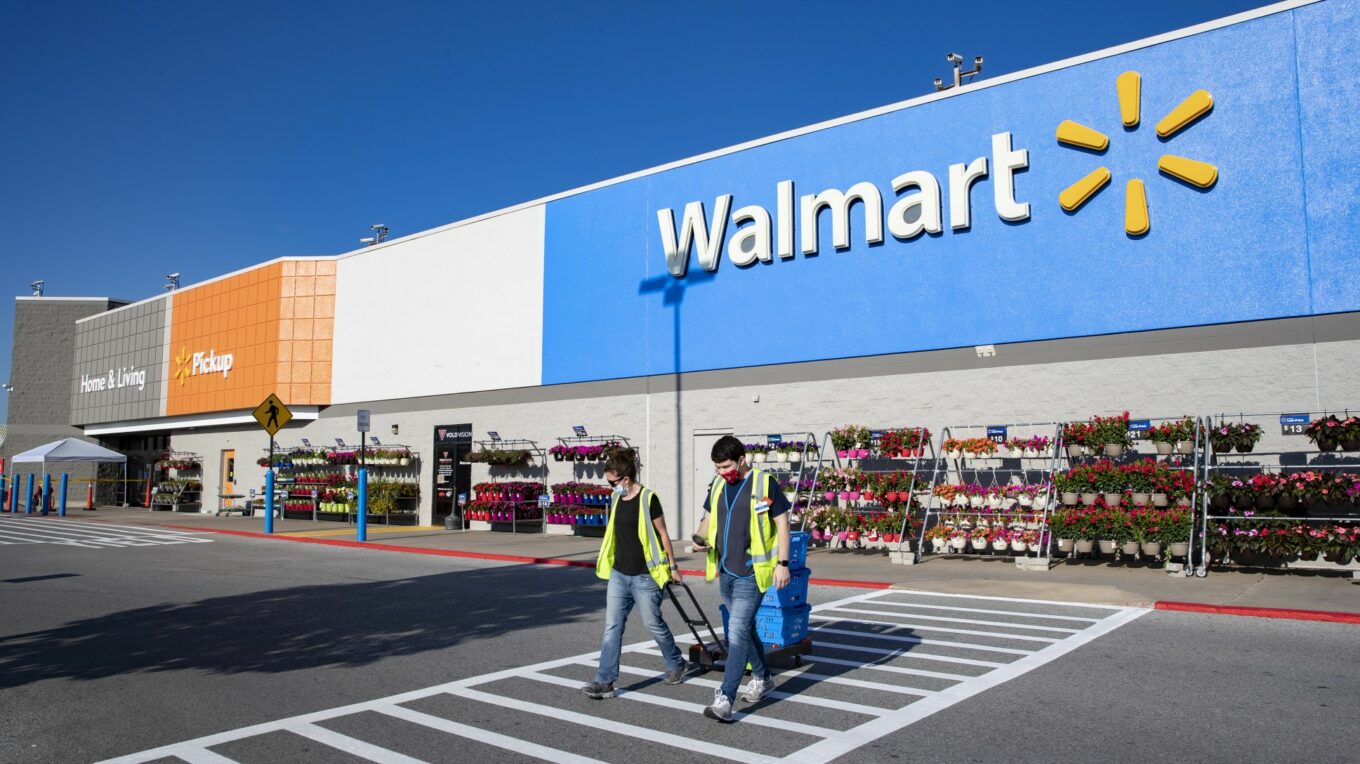Discount Store Earnings Reveal Warning Signs for the Middle Class
Shoppers are shifting to Walmart and Dollar General to save money, but the chains know this and are raising prices.

Many consumers are migrating to no-frills “discount” retailers and private brands as inflation continues to tax the wallets of low- and middle-income Americans.
Walmart, America’s largest retailer by sales, reported an influx of “mid-to-higher” income shoppers last quarter. The Arkansas-based company said it saw consumers shifting their habits: Sales of apparel and electronics declined, while people purchased hot dogs and cans of tuna instead of more expensive proteins like steak. Walmart said that sales of its store brand food products doubled compared to the previous quarter.
Dollar General similarly reported sales growth within high-income households, particularly young consumers earning more than $100,000 a year. Management believes shoppers “traded down” in an attempt to save money. Internal sales data from the Tennessee-based retailer, which has come under fire for charging more on a per-unit basis for name brand products, saw sales for its private-brand products accelerate. “Trade down doesn’t always mean just trading down from other retailers,” outgoing CEO Todd Vasos told investors during the company’s second quarter conference call. “It also is trading down when you get inside the box, and our core customer has been buying more private brands.”
U.S. consumers are still struggling with inflation two years into the pandemic. The US Bureau of Labor Statistics’s Consumer Price Index (CPI) tracks the average cost of commonly purchased goods. Most people consider it a useful measure of overall inflation. This July, the metric was unchanged from June–signaling that the worst inflation may be over. However, CPI is still up 8.5% from the previous year.
Among retail industry analysts, private brands are often viewed as a bulwark against inflation, offering consumers a lower cost alternative to national name-brand products. In a recent earnings call, Walmart CEO Doug McMillion crystalized the view: “We want to help families put meals on the table with great value in our private brands to relieve the pressure they’re feeling.”
According to industry data provider Numerator, this summer, most major retailers saw an increase in private brand sales. Still, the impact of private brands on inflation is debatable. The Wall Street Journal reported, citing data from market-research company IRI, that “grocery sales volumes fell 2.5% in the four weeks ended July 10.” Three weeks later the quarter ended, and both Walmart and Dollar General reported sales growth of over 8%. A J.P. Morgan survey revealed that in August, Walmart increased prices more than any other major US food retailer.
That means that despite adjusting their purchasing decisions, consumers are still getting less and paying more.
Inflation has not drastically impacted buying behaviors across all retailers. Target, which caters to more affluent consumers, mis-forecasted demand and was caught with millions of dollars of homegoods that consumers no longer wanted. Management decided to sell it at a significant discount, which caused the company’s profitability to crumble.
Despite the temporary dip in profits, Target management believes that it actually sold more items across all major product categories. “Our guest is still demonstrating that they have spending power,” the company’s Chief Growth Officer said during its most recent earnings call. “They’re managing their budgets as best fit and they’re finding options at Target.”
Home improvement stores — where the majority of customers are homeowners — saw similar results. Homeowners were big winners of the COVID-19 lockdown era, with many refinancing their mortgage to a lower fixed interest rate, generating significantly more disposable income. “Rather than the DIY consumer trading down like you hear from some retailers,” Lowe’s CEO Marvin Ellison told CNBC, “in many cases we were seeing the opposite.”
At Home Depot, transactions over $1,000 were up almost 12% from the same quarter last year. “Look at the wealth creation over the last 2 years, home price appreciation of almost 40%,” said Richard McPhail, the CFO of Home Depot. “Our customer is just in a really good place right now.” Last quarter, the Atlanta-based home improvement chain delivered the highest quarterly sales revenue in company history, despite 3.1% less volume.
Most major retailers are reporting higher sales revenue, while selling less products
- Compared to the same quarter last year, Dollar General, Dollar Tree, Home Depot, Lowe’s, Target, and Walmart took in more money despite less sales volume than the year before.
- During that same period, the U.S. Department of Commerce estimates that overall U.S. retail sales, unadjusted for inflation, went from $1.6 trillion to $1.78 trillion — an increase of 8%.
- Adjusted for inflation, retail sales may actually be declining. Since May 2021, the consumer price index increased by 10%.
Major retailers are facing pressure to show profits after windfall profits during COVID
- Retailers were big beneficiaries throughout COVID. According to data from NYU, operating margin, which measures a company’s profit after production, sales and administrative costs, increased across the brick and mortar retail industry. Despite facing inflationary pressures, retailers were able to successfully pass most inflation to consumers.
- Currently, many retailers are facing a glut of inventory after over-ordering during the height of the pandemic. Profit margins will shrink as retailers plan to offer promotional discounts to move unwanted products.

 Eric Gardner
Eric Gardner




















